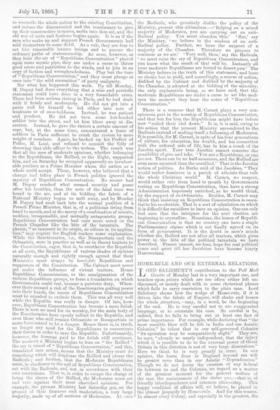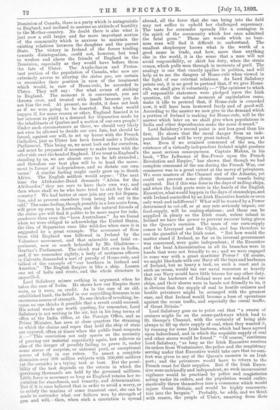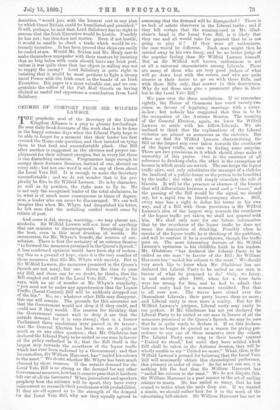HOME-RULE AND OUR EXTERNAL RELATIONS.
LORD SALISBURY'S contribution to the Pall Mall Gazette of Monday last is a very important one, and touches upon points which are too often either left un- discussed, or merely dealt with in some rhetorical phrase which fails to carry conviction to the plain man. Lord Salisbury shows how the wedge of Home-rule, if it is driven into the fabric of Empire, will shake and loosen the whole structure,—may, in a word, be the.beginning of the end. He is very careful not to use exaggerated language, or to overstate his case. So careful is he, indeed, that he fails to bring out at least one fact of prime importance. For example, while declaring that " the most sensible blow will be felt in India and our Asiatic Colonies," he infers that in our self-governed Colonies " its operation may be comparatively slight." They are, he says, " already so nearly independent, that the injury which it is possible to do to the external power of Great Britain in this direction is not of very large dimensions." Here we think he is very greatly in error. In our opinion, the harm done in England beyond sea will be greater even than in our Asiatic " Dependencies." Though we do not desire the creation of any federal tie between us and the Colonies, we regard as a matter of the greatest moment for the general welfare of the race the maintenance of the status quo,—that is, of friendly interdependence and common citizenship. This happy condition of affairs will, we believe, be placed in the utmost jeopardy by Home-rule. And for this reason. In almost every Colony, and especially in the greatest, the Dominion of Canada, there is a party which is antagonistic to England, and inclined to assume an attitude of hostility to the Mother-country. No doubt there is also what is just now a still larger and far more important section of the community which is anxious to maintain the existing relations between the daughter and the parent State. The victory in Ireland of the forces tending towards disintegration, could not, however, but tend to weaken and alarm the friends of England in the Dominion, especially as they would have before them the fate of Ulster. The Anglo-Saxon and Protes- tant portion of the population of Canada, who now are extremely averse to altering the status quo, are certain to reconsider their position in view of the treatment which would, in case of Home-rule, be accorded to Ulster. They will say ' See what comes of sticking to England. The moment it is convenient, you are thrown over, and treated with insult because you do not kiss the rod. At present, no doubt, it does not look as if we were going to be deserted. Bat what would happen if, for some reason or other, England fancied it to her interest to yield to a demand for Separation made by the inhabitants of Quebec and a section of our own people ? Under such circumstances as these, we should very likely not even be allowed to decide our own fate, but should be forced, against our will, to set up house with the French Catholics, just as Ulster has been forced under a Dublin Parliament. This being so, we must look out for ourselves, and must be prepared if necessary to make terms with the other side over the head of England. If we trust to England's standing by us, we are almost sure to be left stranded ; and therefore our best plan will be to head the move- ment in favour of independence, and so dictate our own terms.' A similar feeling might easily grow up in South Africa. The English settlers would argue: ' The next time the Afrikander-Bund demands " Africa for the Afrikander," they are sure to have their own way, and then where shall we be who have tried to stick by the old country ? We had better at once join any cry for Separa- tion, and so prevent ourselves from being left out in the cold.' rhe same feeling,though possibly in a less acute form, will grow up even in Australia, and the natural friends of the status quo will find it politic to be more eager for inde- pendence than even the " born Australians." As we found when we were obliged to acknowledge the United States, the idea of. Separation runs like wild-fire when once it is suggested by a great example. The severance of New from Old England was followed in Ireland. by the Volunteer movement, and that miserable and fatal ex- periment, now so much belauded by Mr. Gladstone- Grattan's Parliament. The shock was felt even in India, and, if we remember rightly, a body of mutinous officers in Calcutta demanded a sort of parody of Home-rule, and talked of the example of " our brethren in Ireland and America." The English Empire is like a ship. Loosen one set of bolts and rivets, and the whole structure is imperilled. Lord Salisbury misses nothing in argument when he takes the case of India. He shows how our Empire there rests, as it were, on credit. As in the case of an old- established bank, the belief in our unyielding firmness is an enormous source of strength. No one thinks of revolting, be- cause no one thinks it possible that a revolt could succeed. His actual words are worth quoting, for remember, Lord Salisbury is not writing in the air, but in his long terms of office at the India Office, at the Foreign. Office, and as Prime Minister, has seen at close quarters the straining to which the chains and ropes that hold the ship of state are exposed, often at times when the public least suspects it :—" This conviction not only spares us the necessity of proving our material superiority again, but relieves us also of the danger of possibly failing to prove it, under some stress of surprise, or national peril, or exceptional access of folly in our rulers. To assert a complete dominion over 300 million subjects with 300,000 soldiers (at the outside) is a trying task at best. But the possi- bility of the task depends on the esteem in which the governing thousands are held by the governed millions. Kittle force is necessary so long as England retains her re- Butation for stanchness, and tenacity, and determination. ut if it is once believed that in order to avoid a worry, or to satisfy the maxims of some transient cant, she can be made to surrender what our fathers won by strength of arm and will,—then, when such a conviction is spread abroad, all the force that she can bring into the field may not suffice to uphold her challenged supremacy. The taste for surrender spreads like a contagion in the spirit of the community which has once admitted the fatal germ." These are words which no busi- ness man will find it difficult to understand. The smallest shopkeeper knows what is the worth of a good name in trade, and how, more than anything else in the world, it is the sense that a man will not avoid responsibility, or shirk his duty, when the strain comes, which pulls men through in moments of peril. The analogy is one that exactly applies in politics, and will help us to see the dangers of Home-rule when viewed in the light of our external relations. As Lord Salisbury points out, it is no good to pretend that, if we give Home- rule, we shall give it voluntarily :—" The opinions to which all responsible statesmen were pledged upon the Irish question, till the actual moment of capitulation came, make it idle to pretend that, if Home-rule is conceded now, it will have been bestowed freely and of good-will. According to the answer we now give to the demand which a portion of Ireland is making for Home-rule, will be the answer which later on we shall give when populations in India and other dependencies make the same demand." Lord Salisbury's second point is not less good than his first. He shows that the naval danger from an inde- pendent Ireland will be very great indeed. Suppose us at war. Even if we retained command of the sea, the existence of a virtually independent Ireland might produce the most serious consequences. Captain Mahan, in his book, " The Influence of Sea-Power upon the French Revolution and Empire," has shown that though we had complete command of the sea during the French War, our commerce was to a great extent at the mercy of 'privateers. We were masters of the Channel and of the Atlantic, yet could not prevent some eleven thousand vessels being captured. But if this was done in the days of sailing-ships, and when the Irish ports were in the hands of the English Executive, whatwould happen in the days of steamships, and with Ireland controlled by an Irish Executive hostile or even only weak and indifferent ? What will be wanted by a Power determined to cut-off, or at any rate Seriously impair, our food-supply, will be coaling-stations ; and these can bo supplied in plenty on the Irish coast, unless inland in Ireland we have the power to prevent succour being given to the Queen's enemies. The mass of our corn-supply comes to Liverpool and the Clyde, and has therefore to run the gauntlet of the Irish coast. " But how would the matter stand if Ireland, so far as its internal government was concerned, were quite independent ; if the Executive and the local Administration in all its branches were in hands that were not friendly to us ; and we were engaged in some war with a great maritime Power Of course, we might blockade with our Navy all the bays and harbours of Ireland, but so heavy a task, on such a coast and in such an ocean, would tax our naval resources so heavily that our Navy would have little leisure for any other duty. But if the harbours of Ireland were not watched by our ships, and their shores were in hands not friendly to us, it is obvious that the supply of coal to hostile cruisers and hostile privateers might be arranged with the greatest ease, and that Ireland would become a base of operations against the ocean traffic, and especially the cereal traffic, of Great Britain."
Lord Salisbury goes on to point out that " a swarm of cruisers might lie on the ocean-pathways which load to St. George's Channel, with the certainty of being able always to fill up their supply of coal, when they wanted it, by running for some Irish harbour, which had been agreed upon beforehand, and in which the requisite supply of coal and other stores would be found." " Of course," continues Lord Salisbury, " as long as the Irish Executive receives its orders from Westminster, the police and the magistracy serving under that Executive would take care that no com- fort was given to any of the Queen's enemies in an Irish port; and the privateers would have to return to the French coast for their supplies. But if the Irish Execu- tive were unfriendly and independent, no such inconvenient vigilance would be practised by police and magistrates acting under its orders, and the population would enthu- siastically throw themselves into a commerce which would injure Great Britain, and would be highly remunera- tive into the bargain." Probably, he adds, and we think with reason, the people of Ulster, smarting from their desertion, "would join with the keenest zest in any plan by which Great Britain could be humiliated and punished." It will, perhaps, be said that Lord Salisbury has no right to assume that the Irish Executive would be hostile. Possibly he has not ; but this does not matter. Even if not hostile, it would be unable to check a trade which would be ex- tremely lucrative. It has been proved that ships can easily be coaled at sea. Would Mr. Sexton and Mr. Healy care to make themselves unpopular with their masters by insisting that no brig laden with coals should leave any Irish port, unless it was quite clear that her object in sailing was not to supply the enemy ? Lord Salisbury is quite right in insisting that it would be most perilous to fight a strong naval Power with the Irish coast in the bands of an Irish Executive. His paper is a most valuable one, and we con- gratulate the editor of the Peal Mall Gazette on having elicited so useful and opportune a contribution from Lord Salisbury.




































 Previous page
Previous page